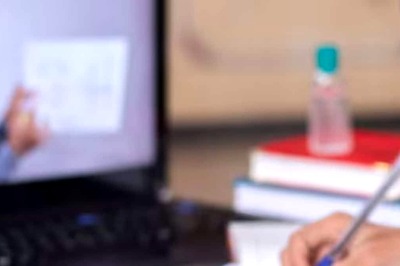
views
When is the phrase “looking forward to working with you” used?
A job acceptance email or letter When you are offered a new job or you’re the one who just made the offer, it’s important to show enthusiasm for your upcoming addition to the company. This phrase is a common way to close an email or letter with a new employer or employee; in fact, you can even say this at the end of a phone call in the same scenario. Depending on the company and the overall vibe the other person gives off, you can choose to say this in a more formal manner by putting “I’m” or “we’re” at the beginning. Some examples include: Formal: “Thank you for your formal offering of the position. I am pleased to accept the role, and I’m looking forward to working with you.” Less formal: “I am thrilled to be given the opportunity of joining the team—looking forward to working with you!” Formal: “We’re so pleased you have decided to accept our offer for this position. We are looking forward to working with you.” Less formal: “We think you’ll make a great addition to the team. Looking forward to working with you!”
A new collaboration Whether it’s in the office or through an entrepreneurial endeavor, expressing excitement over a collab is appropriate, too. For example, maybe you are a professional baker who just hired a graphic designer to come up with ideas for your packaging logos. You could say, “Your past designs are just beautiful—I’m looking forward to working with you!” In an office or other employment setting, an appropriate time to say this would be when you are teamed up with a colleague for a project. For example: “Tim, your knowledge of graphs and charts is unmatched; I’m really looking forward to working on this with you.”
Professional partnerships This is somewhat related to new collaborations, but professional partnerships can include any type of business partnership being made. Perhaps a large company just signed a deal with another corporation—this would be an appropriate time to use the phrase. Example: “We’re so glad your company could come to an agreement with ours. We are highly anticipating this partnership and we’re looking forward to working with you.”
Team introductions When you’re about to join a new team or someone new is joining your team, this phrase expresses an eagerness to be a part of the group. Example: “Thank you all for such a warm welcome, I’m looking forward to working with you!” Example: “Now that the whole team has gotten the chance to meet Kate, our newest employee, we’d just like to say that we’re all looking forward to working with you.”
Best Practices for Using the Phrase
Use this as a closing phrase to convey excitement. “Looking forward to working with you" is meant to be a professional and courteous expression to show enthusiasm, so using it as a closing statement will leave a lasting impression on the recipient. This is usually the last thing you will say in an email before your signature when accepting a job offer.
Match the tone to the rest of your message. If you’re using this phrase in an email that’s extremely formal and uses a lot of business verbiage, you wouldn’t want to use a casual take on this phrase. For example, saying, “Looking forward to working with you! :)” would not be a professional way to approach this email. On the other hand, if the hiring manager has been emailing you with an informal, friendly tone and including smiley faces, it’s completely fine to match their style.
Switch up the wording. Depending on the tone and expressions you’re using in the rest of the conversation, consider swapping out or replacing the words in this phrase for ones that are similar, but more fitting. For instance, saying, “I am looking forward to working with you” gives off a much more formal tone than “looking forward to working with you.” Adding in that simple “I am” can make a world of difference, and the key here is to gauge who you’re communicating with.
What are the benefits of saying “looking forward to working with you?”
It builds rapport. Closing with an expression of anticipation for future collaboration signals your investment in building a strong working relationship. Employers look for employees who are excited about the job and willing to dive in head-first, so by using this expression, you’re showing your commitment to being a great employee.
It shows you’re open to working with others. This positive tone helps create a collaborative atmosphere by conveying your excitement and openness to working together. This is particularly good if your job involves a lot of teamwork, collaborating with others, receiving feedback, or merging ideas.
It shows respect. The phrase "looking forward to working with you" acknowledges the other person's expertise and values their contributions, fostering mutual respect.
Responding to “Looking Forward to Working with You”
Reciprocate the enthusiasm. Whenever someone tells you that they’re looking forward to working with you, match their energy by accepting the compliment and telling them that you’re looking forward to it as well. You can say something as simple as, “I look forward to our collaboration as well,” or, “I’m also excited for the project!”
Thank them. No matter what the circumstance is, thank the other party for their time and willingness to bring you on board. "I'm also excited for this project, thank you for lending your input and skills,” or, “Thank you for offering me the role—I’m eager to collaborate with the team!” are examples that work well here.
Be polite and positive. The tone surrounding this phrase should always be positive, and so should its responses. If someone tells you they’re looking forward to working with you, never use short or unenthusiastic responses like “great,” “cool,” or “same.” Your reply should always show genuine excitement and eagerness to work with them, especially when they are showing you a high level of interest and engagement.
Other Ways to Say “Looking Forward to Working with You”
"I’m eagerly awaiting the opportunity." "I’m looking forward to collaborating with you." "Looking forward to mutual success." "Excited to embark on this joint adventure." "I’m excited to be a part of the team." "Can’t wait to meet the team." "Looking forward to our collaboration." "I’m happy to be a part of the team."


















Comments
0 comment